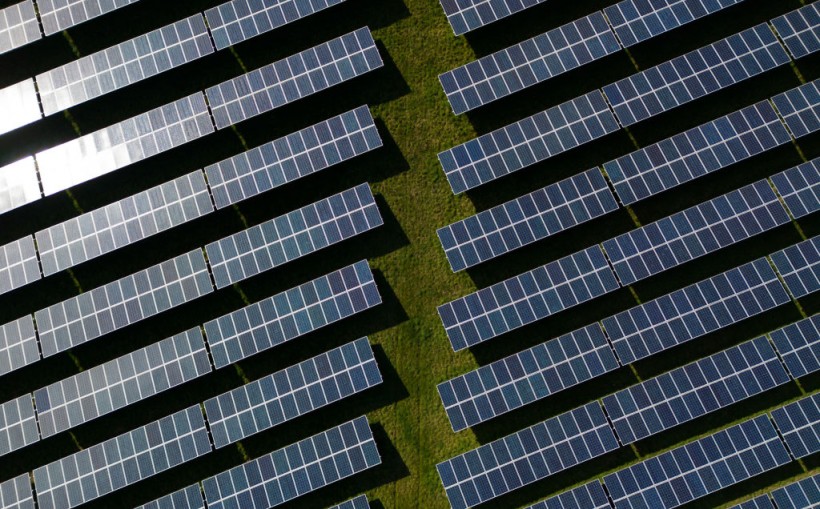The United States is reportedly planning to grant a petition made by South Korean Conglomerate Hanwha Qcells in restoring tariffs on a prominent solar panel technology, stated to be from China, along with other countries.
This is the first time that Qcells' request has been reported. The firm is attempting to defend against competition from less expensive Asian products as it looks to expand its U.S. solar manufacturing presence, a commitment valued at $2.5 billion.

(Photo: DANIEL LEAL/AFP via Getty Images) An aerial view shows the photovoltaic (PV) solar panels making up Manston Solar Farm in south-east England on March 18, 2024.
Hanwha Corp, a Korean conglomerate, detailed its desire in an official appeal to the U.S. Trade Envoy on February 23. The appeal also contained letters of support from seven other businesses that, together, had spent billions of dollars in solar manufacturing in the United States.
The timing of the anticipated reversal has not been decided, according to the sources. Importing taxes on bifacial panels, the primary technology used in utility-scale solar operations would benefit more than 40 solar equipment companies that the United States has planned.
Read Also: Biden Administration Unveils $6 Billion Plan to Slash Industrial Sector Emissions
Organizations Against the Tariff Reversal
Previous trade remedies have created a deep rift in the US solar market, which is driven by developers and installers who need low-cost imports to maintain project prices. Lobbied for the bifacial exception was the leading U.S. solar trade association, the Solar Energy Industries Association (SEIA).
Without directly addressing the exception, the SEIA called for more solar cells to be imported duty-free to support businesses that assemble panels made in the United States.
In 2022, President Joe Biden signed the Inflation Reduction Act, a historic bill addressing climate change. Biden's strategy to combat climate change, revive American manufacturing, and generate millions of union jobs depends on those plants.
The US Solar Panel Market
The tariff exemption reversal comes as prices for solar panels in the US are reportedly at an all-time low due to a flood of Chinese-made panels, great news for those developing renewable energy sources but poses a challenge to solar producers who want to establish a domestic supply chain for the nation's fastest-growing electricity generation source.
According to Wood Mackenzie and the International Energy Agency, China, the world's largest producer of solar technology, quadrupled its production capacity to over one trillion watts last year and is currently producing over three times as many panels as the world needs. In the last year, the price of panels has dropped by 50% globally to as low as 10 cents per watt.
When constructing new solar-generating complexes, US power firms favor imports over more costly domestic panels due to the oversupply in supply. In reaction, despite the large incentives provided by the historic US climate law known as the Inflation Reduction Act, North American firms claim they are abandoning their intentions to expand.
Citing a sharp decline in pricing, Bill Gates-backed solar panel wafer producer CubicPV abandoned plans in February to construct a 10GW US facility that was scheduled to open in December 2022.
Related Article: Climate Tech Jobs on the Rise: A Bright Spot in 2024 Job Market Amid Tech Layoffs

(Photo: Tech Times)





